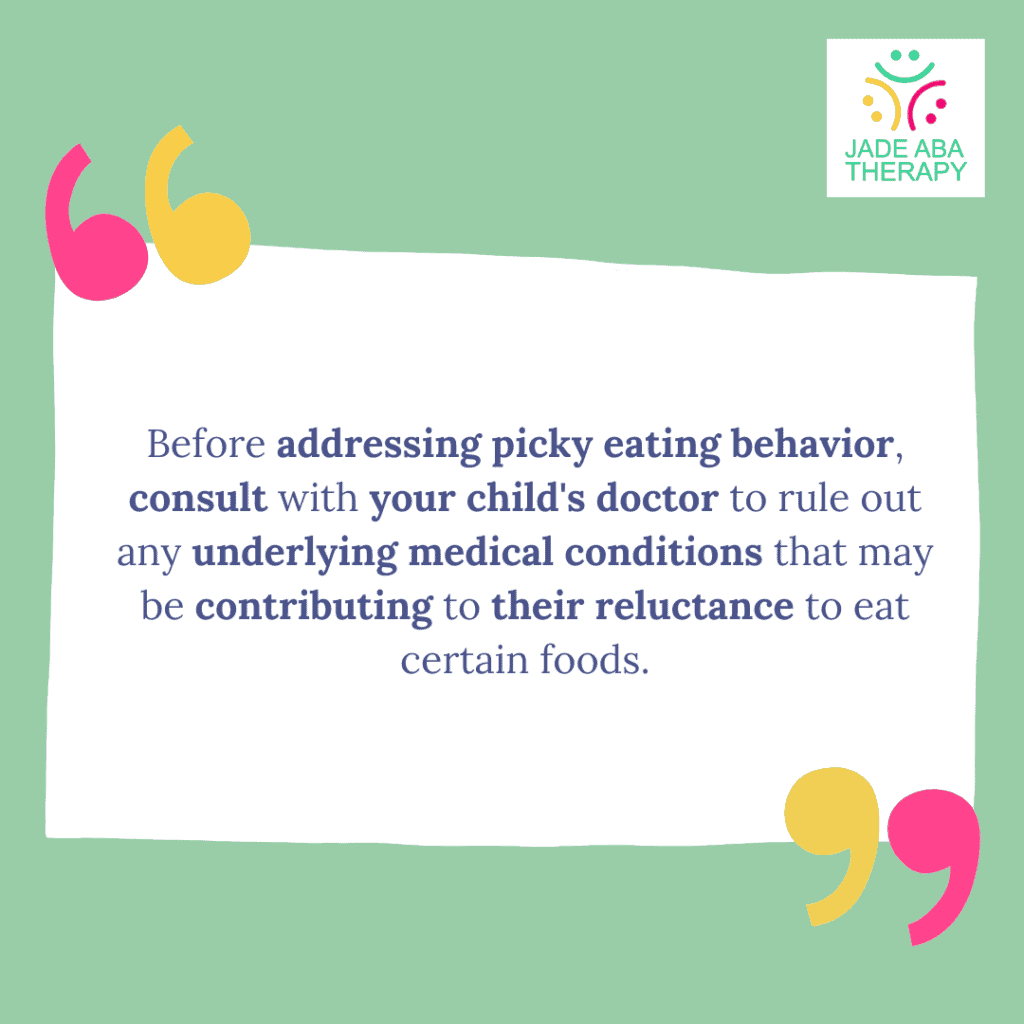As a parent or caregiver, you may have noticed that your child has specific preferences when it comes to food. Perhaps they have a limited range of foods they are willing to eat, or they exhibit sensitivity to certain textures or smells. These eating habits, commonly referred to as picky eating, can be particularly pronounced in children with autism spectrum disorder (ASD). But does picky eating indicate autism?

Autism and Picky Eating Habits
Research from Penn State University suggests that unusual eating behaviors may indeed be an early indicator of autism. In fact, these behaviors were found in 70 percent of children with autism, making them more common in this group. These atypical eating behaviors can manifest in various ways, such as selectivity in food choices, hypersensitivity to textures or temperatures, and even pocketing food without swallowing.
The presence of these behaviors, especially in early childhood, could serve as a cue for parents and caregivers to consider screening for autism. Susan Mayes, a professor of psychiatry, highlights the importance of recognizing these signs early on. Early diagnosis enables children to access necessary treatments, including behavioral therapy, which can facilitate positive changes in their eating habits and overall development.
Children with autism often exhibit a preference for specific foods, such as pasta and bread, or familiar items like chicken nuggets. This selective eating can be attributed to sensory hypersensitivities and resistance to change commonly associated with autism. Keith Williams, director of the Feeding Program, emphasizes the importance of addressing these unusual eating habits to ensure children receive a balanced diet.
The Impacts of Picky Eating Habits on Autistic Individuals
Food aversions and sensitivities are common among individuals with ASD, often complicating mealtime for both the individual and their caregivers. A meta-analysis of scientific studies conducted by researchers at Marcus Autism Center sheds light on the significant challenges faced by individuals with ASD in maintaining healthy eating habits.
The analysis revealed that children with ASD are five times more likely to experience mealtime difficulties compared to those unaffected by the disorder. Moreover, inadequate nutrition is more prevalent among individuals with autism, with deficiencies in essential nutrients like calcium and protein being particularly notable.
Chronic eating problems not only pose immediate challenges but also increase the risk of social difficulties and academic underachievement in affected individuals. Furthermore, there is concern that such challenges may predispose autistic individuals to diet-related diseases such as obesity and cardiovascular issues later in life.
Of additional concern are alternative diets, such as casein/gluten-free diets, which some parents adopt in an attempt to alleviate autism symptoms and related medical issues. While some parents report improvements, these diets can pose challenges in ensuring adequate nutrition, potentially leading to nutritional deficiencies.
Dr. Daniel Coury, medical director of Autism Speaks Autism Treatment Network, emphasizes the importance of assessing diet as part of routine healthcare for individuals with ASD. He encourages families to consult with healthcare providers when considering alternative diets, as these may carry the risk of nutritional deficiencies despite their perceived benefits.

Helping Autistic Children with Picky Eating Habits
Picky eating can be a challenging issue for parents of autistic children, often presenting unique obstacles and concerns. Now, we’ll explore a range of practical approaches to address picky eating in autistic children. By following these strategies and maintaining patience and consistency, parents can help their children overcome picky eating habits.
- Rule Out Medical Issues: Before addressing picky eating behavior, consult with your child’s doctor to rule out any underlying medical conditions that may be contributing to their reluctance to eat certain foods.
- Stay Calm and Patient: Encourage your child to explore new foods at their own pace. Be patient as they gradually become more comfortable with unfamiliar tastes and textures. Avoid turning mealtime into a source of stress or conflict.
- Take Small Steps: Help your child become familiar with new foods by engaging their senses. Encourage them to look at, touch, and smell the food before attempting to taste it. Start with small bites or incorporate new foods into dishes they already enjoy.
- Address Texture Sensitivities: Many autistic children are hypersensitive to textures, which can affect their willingness to try certain foods. Modify the texture of foods by chopping, blending, or cooking them in different ways to make them more palatable.
- Make Mealtime Fun: Turn mealtime into an enjoyable experience by involving your child in food preparation and presentation. Use creative techniques such as food art or themed meals to make trying new foods more appealing.
- Offer Choices and Control: Empower your child by allowing them to have some control over their food choices. Offer a variety of options within predetermined categories, such as vegetables and proteins, to encourage autonomy and exploration.
- Be Mindful of Rewards: While rewards can incentivize behavior change, be cautious not to rely solely on bribes or treats to encourage eating. Focus on fostering a positive relationship with food and promoting a balanced diet for long-term health.

The Takeaway
So, how can caregivers support children with autism who struggle with eating habits? Understanding the challenges they face is the first step. Children with ASD may experience sensory issues, aversions to certain textures, and gastrointestinal (GI) issues, all of which can impact their eating behaviors.
By understanding the relationship between picky eating and autism, parents and caregivers can better support their children in developing healthy eating habits and overall well-being. Early recognition and intervention play a crucial role in empowering children with autism to thrive and reach their full potential.
Sources:
https://www.thebump.com/news/kids-eating-habits-indicator-autism
https://www.uhhospitals.org/blog/articles/2024/01/food-and-autism-is-your-child-a-picky-eater
https://www.autismparentingmagazine.com/how-to-help-your-asd-child-overcome-picky-eating-now